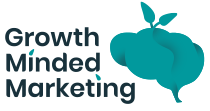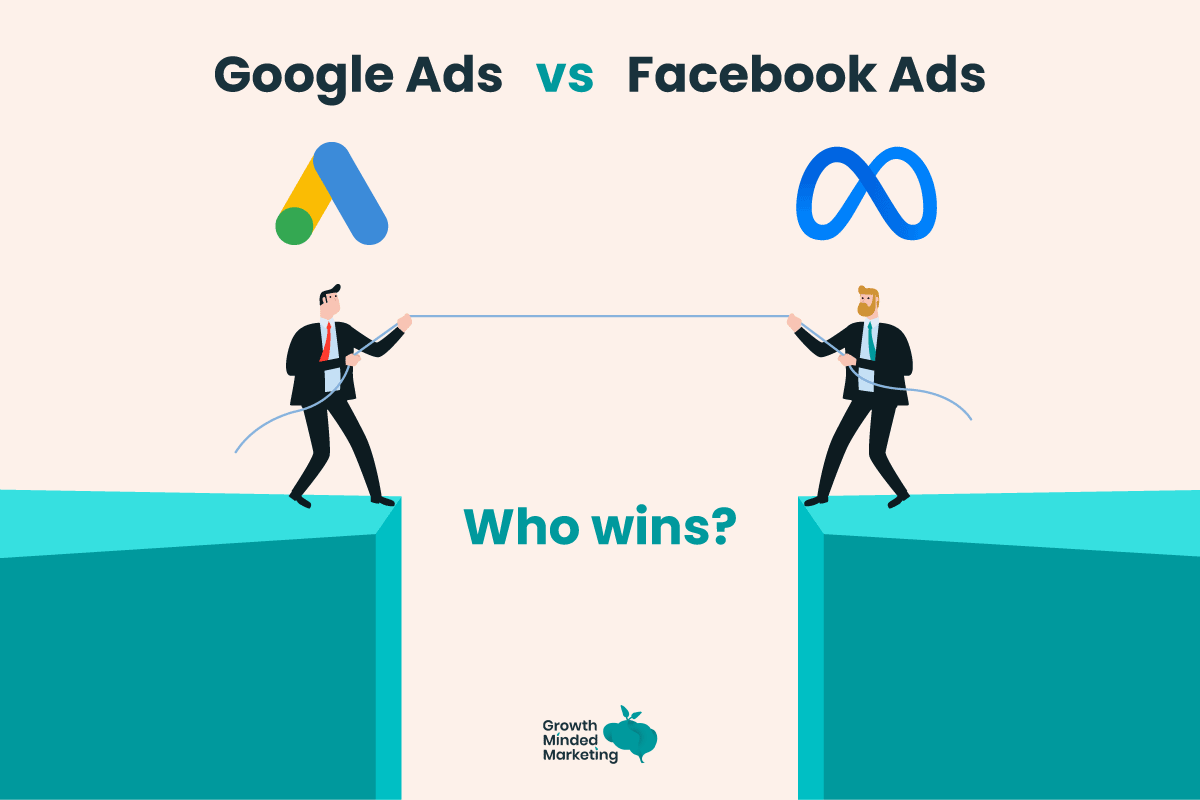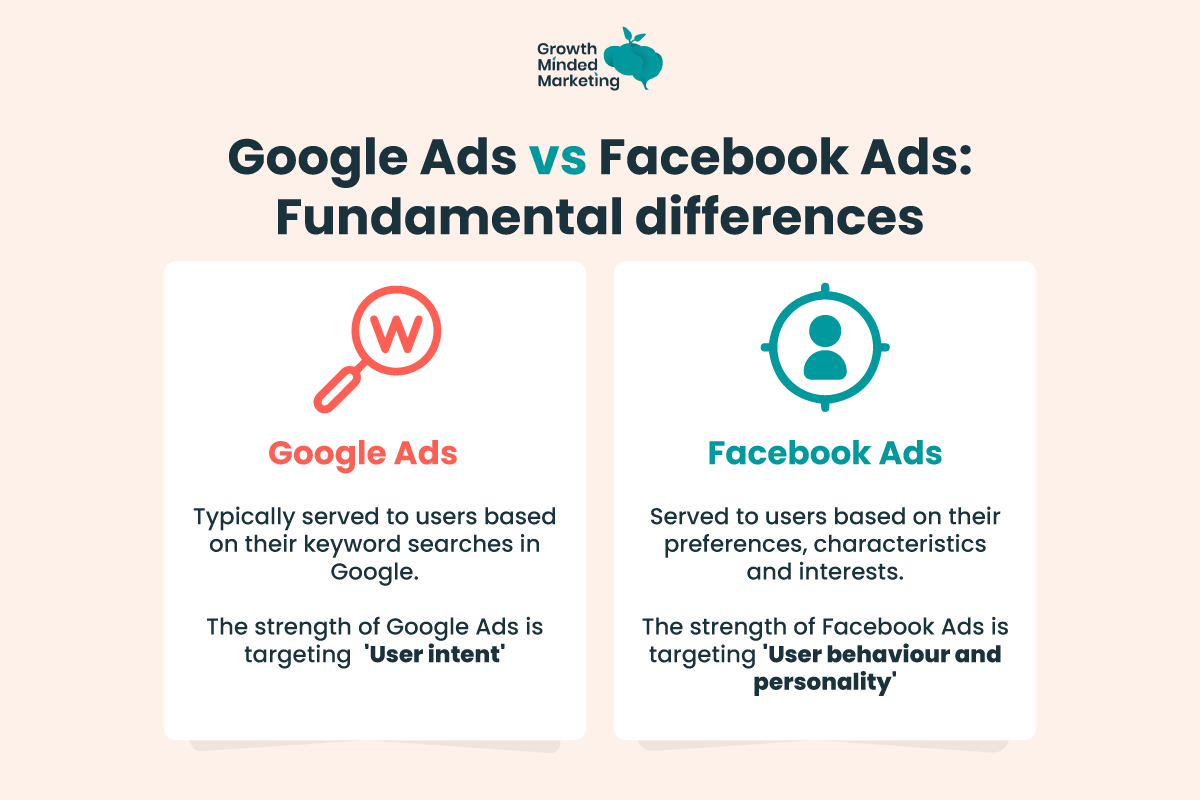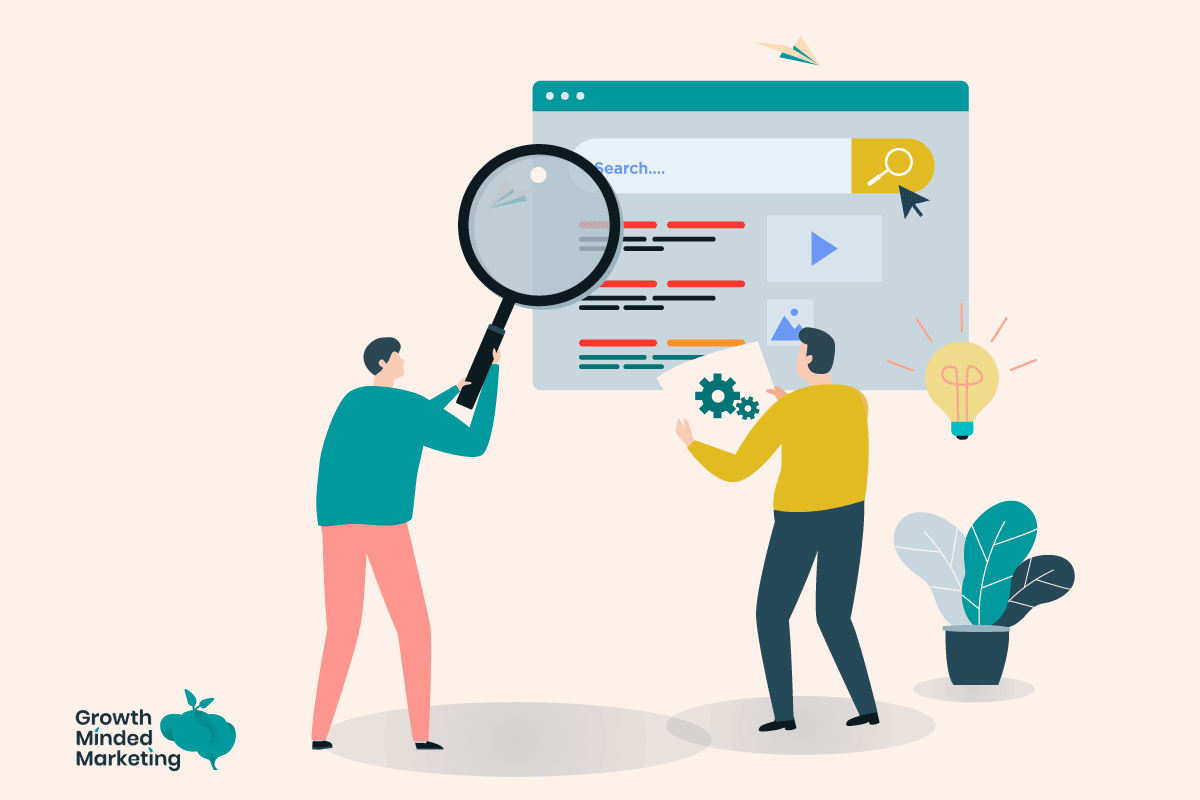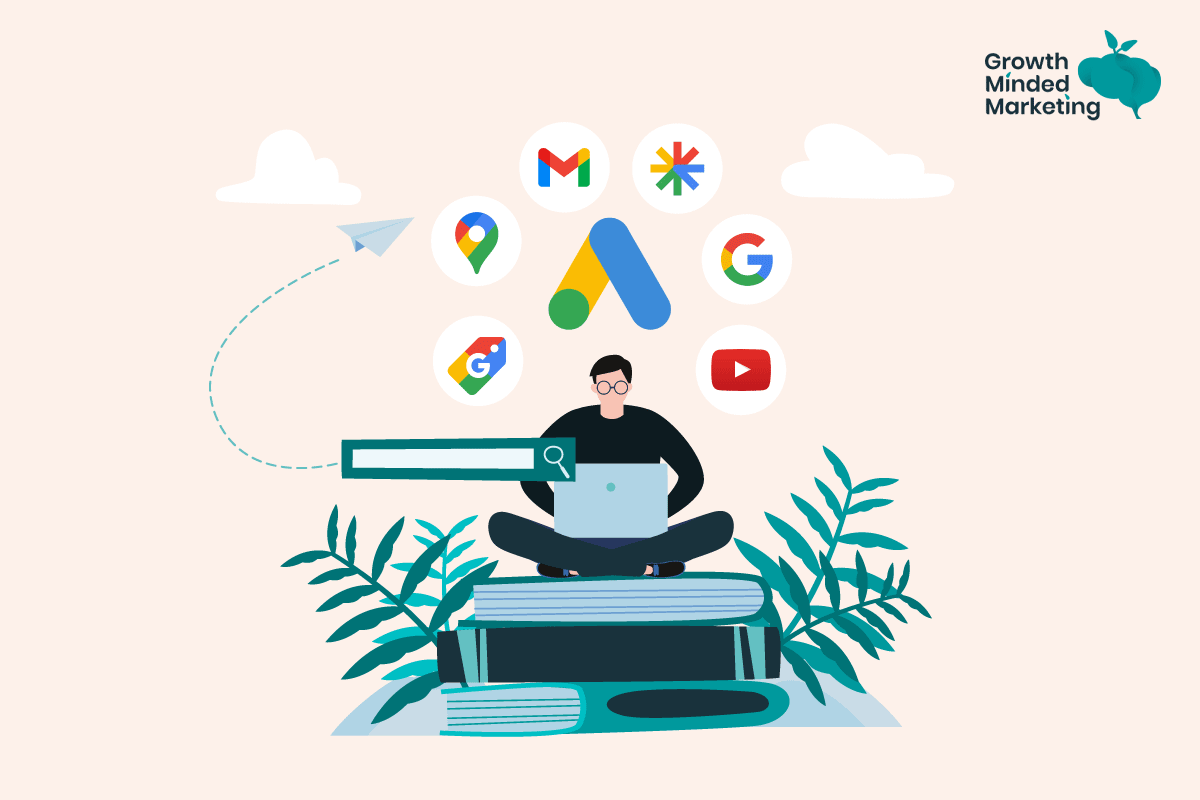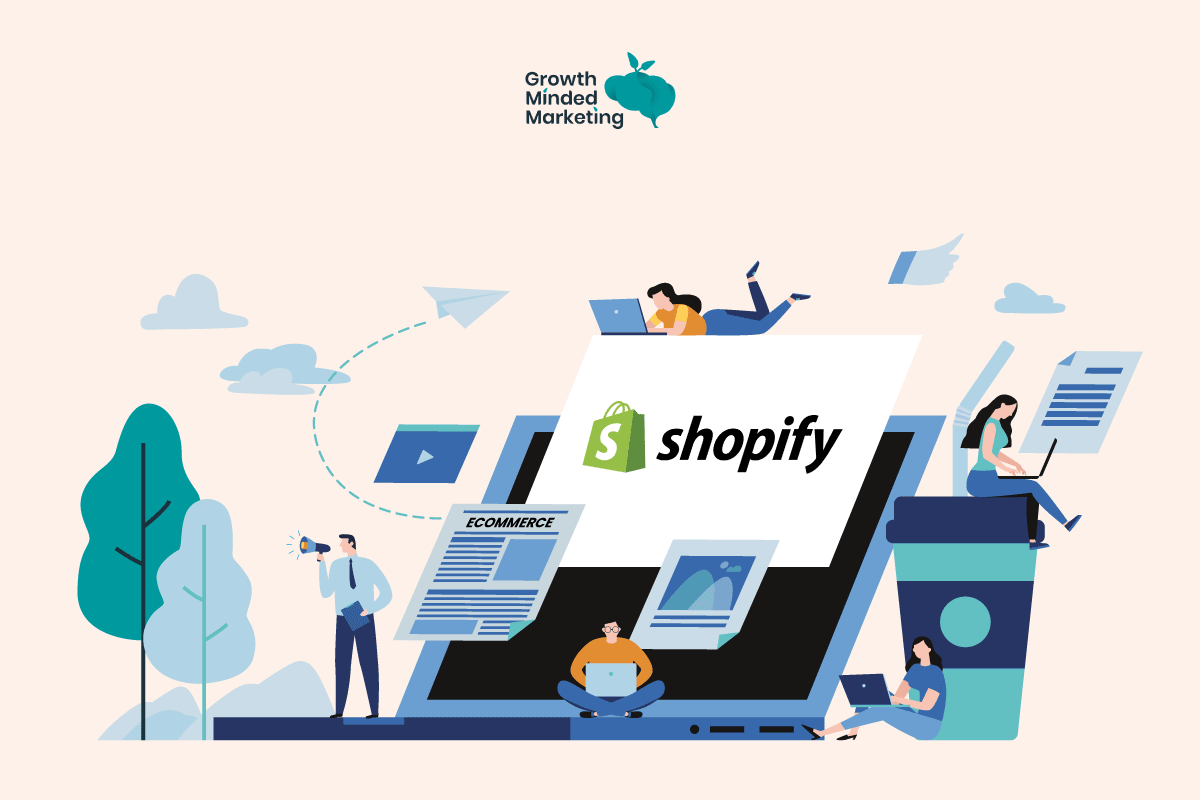In the world of digital advertising, choosing the right ad platform to showcase your brand and offering is key.
Among the most popular platforms, it usually comes down to this: Google Ads vs Facebook Ads.
But how do you decide which ad platform is best suited for your business goals?
Our comprehensive guide dives deep into the strengths, weaknesses, and key differences between Google Ads and Facebook Ads. We aim to empower you to make an informed decision that aligns with your marketing objectives and helps grow your business!
So, who wins?? Let’s dive in.
Table of Contents
ToggleUnderstanding Google Ads
Google Ads is the powerhouse in search engine marketing.
It gives businesses the ability to show targeted ads right where their potential customers are actively searching for what they offer in Google.
But what makes Google Ads a go-to choice for many marketers, and where does it fall short?
Strengths of Google Ads
Below are some of what we think are the core strengths of Google Ads:
High-Intent Targeting
Google Ads is the king of capturing high-intent traffic.
When users search on Google, they’re often researching, looking to make a decision, or seeking a solution.
By targeting these search queries, Google Ads allows you to present your solution right when it’s most needed.
Expansive Reach
Beyond search results, Google Ads extends your reach and ad visibility across a network of Google properties.
This includes Google’s own products like YouTube and Gmail, as well as a vast array of partner websites via the Display Network. This ensures that your ads can reach your audience, no matter where they are on the internet
Advanced Targeting Options
With Google Ads, the precision in targeting goes beyond keywords.
You can tailor your campaigns based on location, language, and device, income level, in-market audiences and more – ensuring your ads reach the most relevant audience.
Weaknesses of Google Ads
Here are some of the main weaknesses of Google Ads:
Cost Considerations
Due to its effectiveness, Google Ads can be an expensive playground, especially for high-competition keywords.
Competition from other advertisers drive up the cost-per-click (CPC). This can make it challenging for smaller businesses or those with limited budgets to compete at the same level.
Technical Complexity
While Google Ads offers robust tools and options for optimisation, navigating these can be daunting.
Success often requires a strong technical grasp of the platform and ongoing optimisation to ensure a good ROI. This might require investing time to learn or hiring an expert (like us, a Google Ads agency).
Further Reading
Understanding Facebook Ads
Facebook Ads leverages power of its vast social network to connect with users based on broader interests, behaviours, and demographic information.
Meta, who owns Facebook, also owns Instagram. Both of these platforms have around 3.19 billion active users worldwide (as of March 2024).
Typically ads are served within Meta’s platforms, when users are using Facebook and Instagram, either in-app or on desktop.
Strengths of Facebook Ads
Targeting Flexibility
Updates have scaled back the previous ultra-specific targeting options (cough cough – the iOS 14 update).
Facebook Ads still offer considerable flexibility in reaching broad audience segments.
Advertisers can target based on general interests, demographic categories, location, and engagement on the platform. This approach is effective for creating awareness to your brand and connecting with potential customers.
Visual Appeal
Facebook and Instagram ads engage users through visually compelling ad formats, which are designed to capture attention and drive interaction within the user’s social feed.
Ads are typically in images, videos, carousels, or story format.
Cost-Effectiveness
Facebook typically offers lower average cost-per-click (CPC) rates compared to Google Ads.
This makes it an accessible platform for brands to experiment with various ad creatives and strategies. It can enable quite a wide audience engagement without a massive ad spend investment.
Weaknesses of Facebook Ads
Lower Intent
The nature of Facebook Ads means they reach users when they’re not seeking a solution to a problem – which means immediate lower purchase intent.
This contrasts with the typical ‘search-driven’ audience of Google Ads. This mean converting interest into action may require more nurturing and creative strategy.
The Demand for Creativity
Success on Facebook heavily relies on the ability to stand out visually, capture attention and to have razor sharp ad copy.
This requires continual creativity, testing and optimisation to find what resonates with your target audience.
Things just ‘go wrong’ sometimes
Facebook ads can just stop working sometimes, and you have very little idea why.
One day your campaigns are working well, then they’re not.
Google Ads on the other hand is much more consistant. Once you’re campaigns are dialed in, a lot of the factors around a drop in performance are ‘known’, like an increase in direct competition, seasonality etc.
Key Differences Between Google Ads and Facebook Ads
It is crucial to understand the fundamental core differences between Google Ads and Facebook Ads.
A lot of what we mentioned above with audiences, demographics etc seem similar, but there’s a big difference in how ads are served.
Facebook Ads typically interrupt users while browsing social media. This is known as ‘interruption marketing’.
Google Ads (particularly Search and Shopping ads) typically show to users that are actively searching for something. This is known as ‘permission marketing’.
Understanding these differences will help you select the right ad platform and strategy for your business.
Here are some key examples where Google Ads and Facebook Ads are different:
User Intent
Google Ads targets users who are actively searching for specific information, products, or services – all markers of a higher purchase intent.
Facebook Ads on the other hand, aim to capture user attention based on their profile data and assumed interests.
Targeting Capabilities
Both platforms offer robust targeting options.
Google Ads focuses typically on keywords and searcher intent.
Facebook Ads are better for demographic and interest-based targeting, based on Meta’s vast user data pool.
Ad Formats
Google Ads primarily offers text-based ads. (There are lots of other campaign types and ad formats, but most associate Google Ads with Search ads)
Facebook’s strength lies in its more visually engaging formats, like videos, carousels, single images and interactive ads.
How to Choose the Right Ad Platform for Your Business?
Choosing between Google Ads and Facebook Ads boils down to understanding your business’s unique needs and goals. You also need to consider the nature of your target audience.
Here are key questions and considerations to help guide your decision.
What are your business objectives?
Are you looking to drive immediate sales or are you more focused on building brand awareness?
Google Ads is typically more effective for direct response objectives, thanks to its high-intent audiences.
Facebook Ads, with its more visually engaging formats, is better suited for brand awareness building and engagement.
Who is your target audience?
Consider where your audience spends their time online, and how they’re likely find out about your brand.
Here are a couple of examples of how each platform might reach their ideal customer:
- Google Ads: Someone’s toilet explodes and they search Google at 1am for ‘emergency plumber near me‘.
- Facebook Ads: Targeting your ethical vegan shoe brand to users who have interests in animal welfare and follows PETA.
What are your budget constraints?
Evaluate your overall advertising budget, and how you can achieve the best ROI.
Facebook Ads may offer a more cost-effective route for broader reach and engagement, but will it lead to direct conversions / sales / leads?
Google Ads can drive direct conversions via targeted keywords, but can it help with brand building and awareness?
If you’re budget constrained, focus on the platform that’s going to deliver the most ROI.
Do you have content and creative resources?
Assess your capacity to produce engaging content.
If you have the ability to create strong visual content and compelling ad copy narratives, Facebook’s formats might serve you well.
If your strength is creating targeted ad copy that captures search intent, Google Ads might be your best bet.
Should You Consider a Combined Approach?
Integrating Google Ads and Facebook Ads into a cohesive advertising strategy can offer the best of both worlds. They both clearly have thier own part in the broader marketing mix.
By running both platforms, you’ll target users at different stages of the customer journey, across multiple platforms.
Here’s how a combined approach can enhance your digital marketing efforts:
- Maximise Reach and Frequency: By using both platforms, you’ll simply boost your brand’s visibility across the web. You can reach potential customers whether they’re searching on Google or browsing their social feeds on Facebook
- Comprehensive Funnel Engagement: You can use Facebook Ads to build cold awareness and interest at the top of the funnel. Then capitalise on that awareness with Google Ads when they use high-intent searches related to your product or service
- Data and Insights: Running campaigns on both platforms provides valuable insights into your audience’s behaviour and preferences. This enables you to refine your targeting and messaging across all your marketing channels based on the audience data
Conclusion
People have been saying for the past decade that the landscape of digital advertising is rapidly evolving.
But it really has shifted a lot in the past few years!
It’s crucial for business owners and marketers to understand the strengths and limitations of platforms like Google Ads and Facebook Ads, and this will help you make informed better decisions that align with your marketing objectives.
Ultimately, there’s no right or wrong platform.
Growth Minded Marketing has a specialism in all things Google Ads, so we’re biased towards that…
And while each platform has its unique advantages, a strategic combination of both can provide a comprehensive approach to digital advertising.
If you have any questions on the Google Ads side, please feel free to book a 30min strategy session and we can discuss your digital marketing needs!
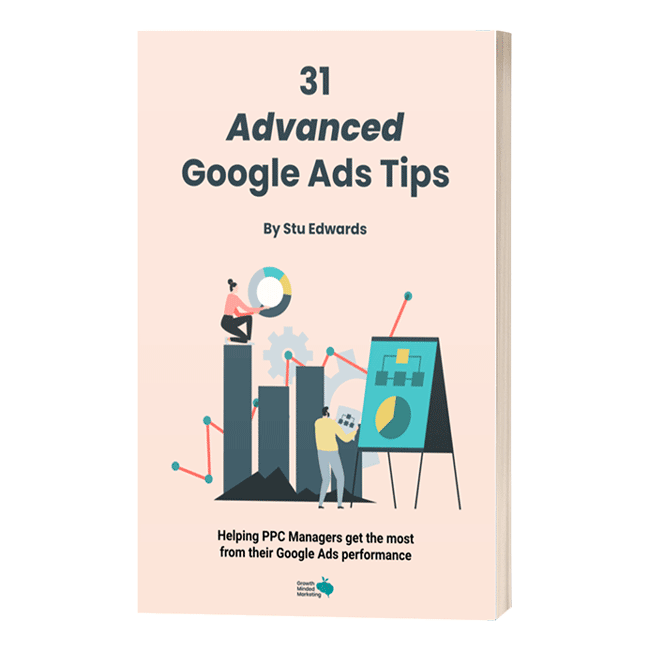
Google Ads tips
Learn advanced tips that PPC professionals use to dramatically increase their Google Ads performance!
